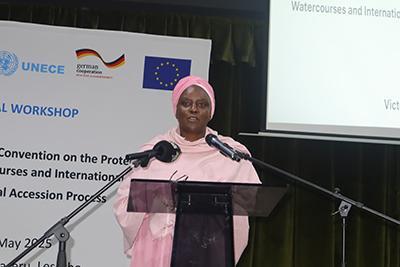Africa-Press – Lesotho. The Government of Lesotho, in collaboration with the United Nations Economic Commission for Europe (UNECE), the German Cooperation (GIZ), and the European Union, recently hosted a two-day national workshop focused on Lesotho’s accession process to the Convention on the Protection and Use of Transboundary Watercourses and International Lakes, commonly known as the Water Convention.
The event served not only to deepen understanding of the Convention’s legal and policy framework but also to explored how water governance can serve as a catalyst for socio-economic development, particularly in rural areas.
The Convention, which promotes the sustainable management of transboundary water resources, has gained importance for landlocked countries like Lesotho, whose water resources are crucial not only for domestic needs but also as a strategic asset in the region.
Lesotho is home to major water infrastructure projects, many of which are located in rural districts and rely heavily on local communities’ involvement.
One of the major highlights of the workshop was the emphasis placed on the untapped opportunities within the water sector for local entrepreneurs, especially those residing in rural communities.
Presentations underscored how improved water infrastructure, sanitation projects, and catchment protection efforts create numerous avenues for small and medium enterprises (SMEs) to thrive.
“From construction and maintenance of infrastructure, to the supply of pipes, sanitation products, and even training services — there is significant room for Basotho entrepreneurs to participate meaningfully.”
The workshop also revealed that Lesotho’s water projects increasingly require local labour and services, ranging from plumbing and engineering to the supply of materials, environmental consultancy, and community outreach.
These needs present viable business opportunities for youth and women-led businesses groups often marginalised in the mainstream economy.
LHDA chief executive, Tente Tente, in his remarks said they are working together with the government, through the Ministry of Education to educate and capacitate village members affected by the projects they are constructing.
“Villagers are to be given skills to help them start their businesses and get qualifications to assist them to get jobs. Such (skills) include farming skills, hospitality and more, especially those in the outskirts of Lesotho,” said Tente.
Participants discussed how capacity building and financial support mechanisms could help rural entrepreneurs access these opportunities.
Development partners pledged support in the form of training, technical assistance, and potential funding channels to help local businesses meet the standards required for participating in national and international water-related projects.
United Nations (UN) Resident Coordinator Lesotho, Amanda Khozi Mukwashi, in her remarks said as Lesotho moves toward accession to the Water Convention, there is growing consensus that water governance must go hand-in-hand with local economic empowerment.
“For Lesotho, water is not just a resource, it is a strategic national asset and a cornerstone of sustainable development,” said Mukwashi
“The country’s abundant water resources, if managed sustainably and inclusively, have the potential to support national development goals, reduce poverty, and stimulate job creation,” she said.
“We must also emphasise that water governance is not only about agreements and frameworks it is about people. The success of any initiative depends on inclusive participation. Leave No One Behind,” said Mukwashi.
“Lesotho’s water is our shared wealth, protecting it means empowering people, especially in rural areas, to be part of the solution and to benefit from its potential.”
For More News And Analysis About Lesotho Follow Africa-Press






